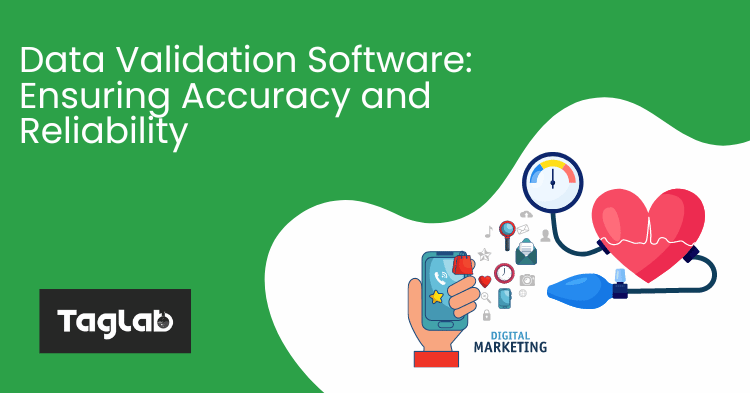Your cart is currently empty!
Ensuring Accuracy and Reliability – The Power of Data Validation and Verification Software

In the recent data-driven world, the accuracy and reliability of information are of paramount importance. Incorrect or unreliable data can lead to misguided decisions, wasted resources, and potentially severe consequences for businesses and organisations. This is where data validation and verification software comes into play. Explore the significance of data validation and verification and how software like TAGLAB can revolutionise the practice to ensure data accuracy and reliability.
Understanding Data Validation and Verification
Before delving into the power of data validation and verification software, it is crucial to understand the concepts themselves. Data validation is the process of ensuring that data is accurate, complete, and consistent. It involves checking data against predefined rules or constraints to identify inconsistencies or errors. On the other hand, data verification refers to confirming the accuracy and integrity of data through various validation techniques.
Imagine a scenario where an e-commerce website collects customer information during the checkout process. If the data collected, such as email or shipping addresses, it might be a privacy violation. Or if product and transaction data is not accurate, it will result in wrong reporting, conversion attribution issues, or it would be impossible to build accurate retargeting audiences; this is where data validation and verification step in to prevent such issues.
The Importance of Accurate Data
Accurate data is the foundation of effective decision-making. Businesses depend on the data to analyse market trends, customer behaviour, and operational efficiency. If the data feeding into these analyses is flawed, the results will be jagged- leading to misguided strategies and potentially significant losses. For instance, an advertising campaign targeting the wrong demographic due to inaccurate data can waste precious marketing resources and yield minimal returns.
Software like TAGLAB helps automate the process of checking data for accuracy and completeness, reducing the margin for human error. The software utilises advanced algorithms to compare data against predefined rules and patterns, flagging any inconsistencies for further review. It not only saves time but also ensures a higher level of accuracy compared to manual data checks.
Benefits of Data Verification Software
Enhanced Data Accuracy: The data verification software’s intelligent algorithms can identify discrepancies that human eyes might miss. It significantly reduces the chances of inaccurate data getting into your systems.
Time and Resource Savings: Manual data validation and verification can be time-consuming and resource-intensive. Software like TAGLAB automates these processes, allowing your team to focus on more strategic tasks.
Reduced Errors: Human error is inevitable, but with automated software you can minimise its impact. Automated validation and verification lessen the risk of errors caused by fatigue or oversight.
Scalability: Maintaining data accuracy becomes more challenging as your business grows and data volumes increase. The software scales effortlessly, ensuring your data remains reliable even as your operations expand.
Customizable Rules: It allows you to define custom validation rules tailored to your specific data requirements. This flexibility ensures that the software aligns with your unique business needs.
Data Integrity: Data verification ensures that the information has not been altered or corrupted during storage or transmission – this is crucial for maintaining the integrity of critical data.
Implementing Data Validation and Verification
Integrating TAGLAB into your data management processes is a straightforward yet impactful step. First, identify the critical data fields that require validation and define the validation rules. These rules could include formats, ranges, and logical checks. Then, set up the software to automatically validate incoming data against these rules.
Regularly scheduled data verification checks should also be established to ensure that stored data remains accurate and unaltered. It is particularly significant in sectors with stringent compliance and regulatory standards, such as finance and healthcare.
Conclusion
In a data-driven era, ensuring accuracy and reliability is non-negotiable. Data validation and verification software, exemplified by TAGLAB, offer a powerful solution to this challenge. By automating the process of checking data against predefined rules, these tools enhance accuracy, save time, and reduce errors. The result is more informed decision-making, streamlined operations, and a competitive advantage in the dynamic business landscape. Embracing data validation and verification software is not just a technological upgrade. It is an investment in the trustworthiness and longevity of your data-driven endeavours.
[smart_post_show id=”16588″]



